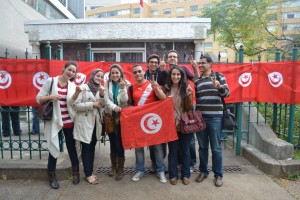Charlotte Observer 3/5/2016
Elections offer a time for us to seek justice, not people just like us
BY ROSE HAMID
Guest column

Muslims voting in Tunisia 2011. The ink on the fingers is used to indicate the person has voted and prevents them from voting again. Photo courtesy of Mariem Masmoudi
As North Carolina enters the primary season folks may wonder if Islamic ideals are in keeping with American democratic ideals. The answer is yes.
One should look at the example of the Constitution of Medina for evidence of how Prophet Muhammad (peace be upon him) established a pluralistic society in the city of Medina in 622 CE.
Prophet Muhammad (pbuh) grew up in Mecca at a time when the inhabitants had become idol worshipers. He started to receive revelations in 610 CE. He and his followers were harassed (to put it lightly) because, like other monotheistic prophets who came before him, the message he received did not sit well with the ruling parties since it would upset the power dynamic of their society.
Eventually the people of the neighboring city, Medina, heard about the prophet’s message and invited him to come rule their city in the hopes of ending ongoing intertribal battles.
The people of Medina who had accepted Islam, plus the Muslims who migrated from Mecca, made up a small percentage of the population of Medina. The rest of the tribes were either idol worshipers or Jews, yet they all agreed to follow the rule of Prophet Muhammad (pbuh).
In order to govern the area effectively, he, in consultation with the tribes, put together a constitution that outlined the responsibilities of the new government to the people under its protection and the responsibility of the people to the government and each other. Some of the rules were:
▪ Those who were not Muslim were not required to follow the Islamic faith (in keeping with the Quran 2:256 “There is no compulsion in religion”).
▪ Jewish tribes were permitted to follow their teachings and govern themselves accordingly.
▪ An attack on any of the tribes in the covenant by outside forces would require all tribes to join the battle against the aggressor.
This example demonstrates how pluralism was a part of Islamic governance from the beginning.
Another aspect of Islamic governance is the notion of governing through consultation. Chapter 42 of the Quran is titled “Consultation” (Ash-Shura). Verse 38 refers to those with whom God will be pleased as “Those who answer the Call of their Lord, and establish regular Prayer; who (conduct) their affairs by mutual Consultation….” 42:38.
In a democracy the citizens are asked for their counsel. However, as Thomas Jefferson said, “A properly functioning democracy depends on an informed electorate.”
It is imperative that those with the privilege/responsibility of voting take their charge seriously. Many people go into the voting booth ready to vote in the “Big” race, like for the president, not realizing what else is on the ballot. It’s very important to pay attention to local races as those officials may have a greater impact on our day-to-day lives. Before going to the polls, it’s a good idea to know what will be on the ballot so informed decisions could be made.
We may feel tempted to vote for people simply because they are like us in some way, but when voting, look for people with integrity and good character who will follow the Constitution and recognize the rights of all citizens.
The Quran says: “Oh you who believe, be securers of justice, witnesses for God, and do not let the hatred of a people prevent you from being just. Be just; that is nearer to righteousness….” 5:8.
Rose Hamid of Charlotte is president of Muslim Women of the Carolinas
